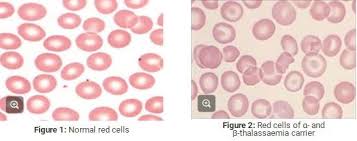Thalassemia Minor Or Trait
what is minor thallasemia or trait?
What is Thalassaemia trait?
If you have been diagnosed with the Thalassaemia trait, this is simply another way of saying that you carry the genetic trait for Thalassaemia.
A genetic trait is a kind of message or code contained in your body .You may pass this code on to your children, and they may pass it on to their children.
You may, for instance, carry the genetic trait for blue eyes, even if you yourself have brown eyes.
Thalassaemia trait is not a disease or condition but a kind of genetic possibility that you pass on to your descendants.
The Thalassaemia trait is not a disease.
Medical personnel often tell people who carry the Thalassaemia trait that they “have Thalassaemia” which can lead trait carriers to believe that they have some kind of health – threatening medical condition. This is not true.
Medical terminology refers to the “Thalassaemia minor”. So while it may be technically correct to say that trait carriers “have Thalassaemia” (or, more properly, “Thalassaemia minor”), trait carriers should be aware that carrying the genetic trait for Thalassaemia is not the same thing as having a disease.
The Thalassaemia trait requires no medical treatment.
Physicians sometimes mistakenly prescribe iron supplements for Thalassaemia trait carriers, usually because they mistake the small size of the trait carrier’s red blood cells with iron- deficiency anemia.
The only way to properly determine the need for iron supplements is to have a physician test iron levels in the patient’s blood. Without a test of blood iron levels, iron supplements should not be prescribed for Thalassaemia trait carriers.
The Thalassaemia trait cannot become worse or turn into a serious disease.
Because the Thalassaemia trait is a genetic trait and not a health condition, it cannot “become worse” or change into one of the more serious forms of Thalassaemia that may require medical treatment.
Why should I be concerned about the Thalassaemia trait?
Even though the Thalassaemia trait has no symptoms and cannot directly affect your health, it can indirectly affect your health and directly affect the health of your children.
Doctors may mistake your Thalassaemia trait for a different condition and prescribe unnecessary and potentially harmful tests or treatments.

Here are key points about thalassemia minor:
Genetic Inheritance: Thalassemia minor is inherited in an autosomal recessive pattern. This means that a person inherits one normal gene and one mutated gene from their parents. They are carriers of the condition but typically do not show significant symptoms.
Hemoglobin Production: Individuals with thalassemia minor have a reduced production of either alpha or beta globin chains, depending on whether it’s alpha or beta thalassemia. Despite having reduced production, their hemoglobin levels are usually sufficient to prevent significant anemia.
Symptoms:
- Thalassemia Minor (Beta Thalassemia Trait): Mild anemia, which may cause mild fatigue or weakness. Many individuals with thalassemia minor do not require any treatment and may not even be aware they have the condition unless diagnosed through blood tests.
- Alpha Thalassemia Trait: Generally asymptomatic or may have mild anemia, similar to beta thalassemia trait.
Diagnosis: Diagnosis is typically made through blood tests that measure hemoglobin levels and identify abnormal hemoglobin variants. Genetic testing may also be performed to confirm the presence of one mutated gene.
Treatment: Treatment is usually not required for thalassemia minor since symptoms are mild or absent. However, it’s important for individuals with thalassemia minor to be aware of their carrier status, especially if they plan to have children, as there is a risk of passing on the mutated gene to their offspring.
Prognosis: The prognosis for individuals with thalassemia minor is generally excellent. They can lead normal lives without any significant health issues related to the condition. Regular monitoring by healthcare providers may be recommended to ensure overall health and well-being.
The Parents’ Association Thalassemic is the national non –profit health organization dedicated to serving patients afflicted with various forms of Thalassaemia most notably the major forms of this generic blood disease

